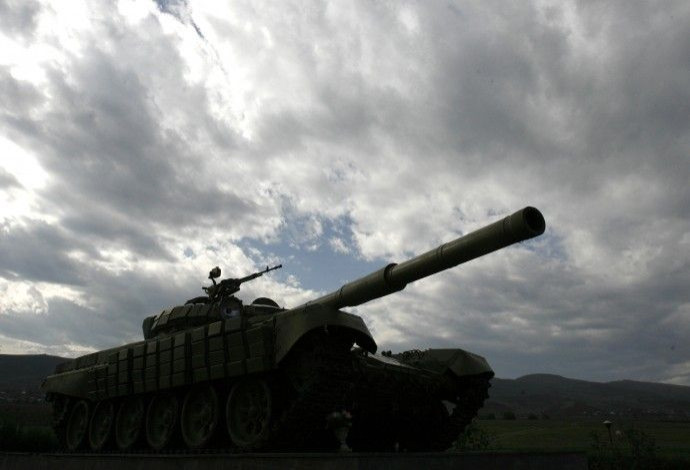The looming war in Caucasus...
Armenia, Azerbaijan are yet again set to battle for control over Nagorno Karabakh

A war is brewing in the mountains of the South Caucasus. Even as the battling sides have accelerated the transfer of dead and repatriation amongst themselves, there is little hope that the conflict could die down.
Early this month, close to the line of contact in the Agdam region of Azerbaijan, the International Committee of the Red Cross transferred bodies of two Azerbaijani soldiers from the Armenian side. Both soldiers were recently killed in the conflict zone of the unrecognized Nagorny Karabakh Republic (NKR). The swap was the outcome of an agreement between Presidents of both sides in Moscow last month.
Observers believed that this move could foster a ceasefire regime and help in confidence building measures between both sides. But an exchange of blemishing statements, and an increased military activity in the region over the past few days, seems to have strained the peace efforts.
Armenians do not get tired of deceptive acts. May be it is some kind of illness or hopelessness, the Chief of press service of Azerbaijan's Defense Ministry Eldar Sabiroglu told the Azeri Press Agency on Saturday.
When Azerbaijan announces something true on ruined and unorganized situation of Armenia, or something about decisive attitude in the direction of solution to the conflict, it (Armenia) begins to demonstrate 5-6 tanks and 1-2 combat vehicles in Nagorno Karabakh and calls it large-scale military exercise, he added.
His response came in the wake of the reports that Armenian armed forces held a large-scale military exercises close to Azerbaijan army positions last week. The exercise was reportedly monitored by Armenia's visiting President Serzh Sarkisian and Defense Minister Seyran Ohanian. Authorities in the NKR and Armenian military remained tight-lipped on the exercise but locals claimed that powerful explosions caused mild tremors at the line of contact.
The military exercise is seen as Armenia's reply to Baku's threats of 'mobilizing all powers to settle the issue'. On Thursday, addressing a gathering at the opening of an Olympic sport complex, Ilham Aliyev, the Azerbaijani president seemed like he was leaving nothing to chance. In his speech he reiterated that the resolution of the Karabakh issue remains a top priority.
Certainly, it would be good to settle it (Karabakh issue) peacefully, without war. But unfortunately, this is impossible so far since the non-constructive position of Armenia and the artificial protraction of negotiations promote freezing of the current situation, he said.
Yerevan, however, criticized Baku for inciting tensions in the region. Claiming that their exercise is just another regular military drill in the region, officials maintain that the Armenian government is keen on continuing the negotiations to agree upon the fundamental principles of conflict resolution.
Confidence and security in military field towards the NK conflict resolution are in fact important elements, but it has been continuously rejected by Azerbaijan. The atmosphere is tensed by armed statements and threats made by the Azerbaijani authorities, which are aimed to fail the negotiations, Ashot Hovakimyan, Ambassador of Armenia to Organization for Security and Co-operation in Europe (OSCE) said on Saturday.
The conflict between the countries began in 1988 as Armenians made territorial claims against Azerbaijan. In an offensive, Armenian armed forces occupied several regions of Azerbaijan, including the Nagorno-Karabakh since 1992. The armed conflict ended in 1994 following a ceasefire agreement between both sides.
The secessionist movement went on however, and Nagorno-Karabakh announced itself as an independent state and aligned with the Republic of Armenia ever since. Armenia reportedly provided aid, weapons, and volunteers to Karabakh to combat Azerbaijani forces. The country has been insisting on recognition of the Karabakh people's right to self-determination and to prohibit any use of force against the population by Azerbaijan.
Now, there are fears that an agreement between both sides might not be reached despite foreign intervention which could also fuel further tensions in the region. The OSCE Summit, scheduled for early next month in Astana, Kazakhstan, is to discuss the issue in the presence of representatives from Russia, France, and the United States along with other member countries. But OSCE in their recent annual report maintained that the situation in the region remains tense. Analysts in the region are also not hopeful of achieving a breakthrough at the summit.
Any agreement (between both sides) is possible only provided that Azerbaijan agrees to Armenia's main provision - recognition of the right of the people of Nagorno-Karabakh to self-determination - or, to be more exact, agrees to an interim status for Nagorno-Karabakh, the News.Az quoted Manvel Sargsyan, an expert at the Armenian Centre of Strategic and National Studies.
It's not easy to imagine that Azerbaijan is ready to take this step. Azerbaijan's government is well aware that its agreement to interim status could cause a chain reaction of international recognition of NKR independence.
He added that neither does Armenia nor will NKR government accept the inclusion of the NKR under the control of Azerbaijan. The expert maintained that summit in Astana will go no further than a declaration on the political readiness of the parties to settle the conflict.
Azerbaijan holds strategic importance to the West as it falls in the transit route for U.S. military operations in Afghanistan. The country which is also a major oil and gas exporter has been backed by Russia and Turkey. The country in the recent years had reportedly increased military spending by approximately ten folds. The procurement of new weaponry in the past few months is also seen as preparations to an impending war.
© Copyright IBTimes 2025. All rights reserved.





















